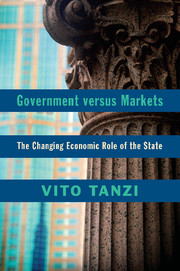Book contents
- Frontmatter
- Contents
- Preface
- PART ONE THE ECONOMIC ROLE OF THE STATE
- PART TWO HISTORICAL REVIEW
- PART THREE THEORETICAL AND ANALYTICAL ISSUES
- 7 Theories of Public-Sector Behavior
- 8 Voluntary Exchange and Public Choice Theories
- 9 The Nordic European Economic Theory of Fiscal Policy
- 10 Policy Tools and Government Roles
- PART FOUR THE OUTCOME OF STATE INTERVENTION
- PART FIVE ON THE ECONOMIC ROLE OF THE STATE IN THE FUTURE
- Notes
- Index
- References
9 - The Nordic European Economic Theory of Fiscal Policy
Published online by Cambridge University Press: 07 October 2011
- Frontmatter
- Contents
- Preface
- PART ONE THE ECONOMIC ROLE OF THE STATE
- PART TWO HISTORICAL REVIEW
- PART THREE THEORETICAL AND ANALYTICAL ISSUES
- 7 Theories of Public-Sector Behavior
- 8 Voluntary Exchange and Public Choice Theories
- 9 The Nordic European Economic Theory of Fiscal Policy
- 10 Policy Tools and Government Roles
- PART FOUR THE OUTCOME OF STATE INTERVENTION
- PART FIVE ON THE ECONOMIC ROLE OF THE STATE IN THE FUTURE
- Notes
- Index
- References
Summary
Introduction
In the 1950s and 1960, there was much writing about “collective action.” In a setting where the preferences of individuals matter and where “the state is not seen as an organic unit wherein the individual is absorbed in the ‘whole’ and there is no benevolent dictator” (Musgrave, 1998, p. 31), how should the votes of individuals be aggregated to guide policies? The electors elect their representatives in the government, who, in turn, make the decisions, presumably on the basis of the promises they made before the elections. However, the elected representatives might not be able to interpret correctly the voters' preferences; or, worse, might intentionally misinterpret them to promote personal gains or the gains of related groups. An additional complication that was soon recognized was that the voters might themselves have little interest in investing their time and money to learn about specific policies because, while such an investment would be costly for them, their vote, being one among millions, would be unlikely to change the election results. This problem becomes more significant as the number of government programs and their complexity increases in line with an expanded role of the state and the number of voters also increases. Thus, the electors may choose to remain “rationally ignorant” and cast their vote mainly on the basis of often-irrelevant impressions or of single, but visible, issues (see Olson, 1965 and 1982).
- Type
- Chapter
- Information
- Government versus MarketsThe Changing Economic Role of the State, pp. 193 - 204Publisher: Cambridge University PressPrint publication year: 2011



